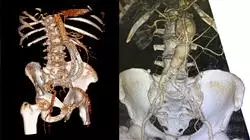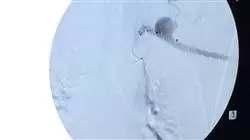University certificate
The world's largest faculty of medicine”
Introduction to the Program
Get a complete update in Vascular Surgery through an online Professional master’s degree with a comprehensive approach"

Research and innovation go hand in hand in the field of Vascular Surgery. Therefore, there have been continuous and rapid changes in the use of new technology to plan and practice surgical interventions. Likewise, the improvement of materials, the development of devices for the treatment of vascular diseases or the use of cell therapy have made it possible to improve the health of patients.
A scenario that leads specialists to constantly update their knowledge. For this reason, this educational institution has created this Professional master’s degree with 1,500 teaching hours and with the most advanced syllabus, prepared by experts in this field. It is a program that will lead students to enhance their skills and competences in the physiopathology of Vascular Diseases, in the methods of diagnosis in Vascular Pathology, the monitoring of Venous Diseases, as well as the latest research in this field. All this, from a theoretical-practical approach, complemented by video summaries of each topic, videos in detail, specialized readings and case studies.
In addition, thanks to the Relearning system, the graduate will advance naturally through the syllabus, effectively consolidating the most important concepts of this first level educational itinerary.
Undoubtedly, an ideal opportunity for those who are looking for an update through a comfortable and flexible program. Students only need an electronic device with internet connection to visualize, at any time of the day, the content of this program. An unparalleled educational option that adapts to the agenda and real needs of professionals.
Thanks to the TECH simulation scenarios, the specialist will be able to delve into the most complex surgical techniques"
This Professional master’s degree in Vascular Surgery contains the most complete and up-to-date scientific program on the market. The most important features include:
- The development of practical cases presented by healthcare experts in Patients Quality and Security
- The graphic, schematic, and practical contents with which they are created, provide scientific and practical information on the disciplines that are essential for professional practice
- Practical exercises where self-assessment can be used to improve learning
- Its special emphasis on innovative methodologies
- Theoretical lessons, questions to the expert, debate forums on controversial topics, and individual reflection assignments
- Content that is accessible from any fixed or portable device with an Internet connection
A qualification that will allow you to be up to date in the treatment of vascular diseases in just 12 months"
The program’s teaching staff includes professionals from the field who contribute their work experience to this educational program, as well as renowned specialists from leading societies and prestigious universities.
The multimedia content, developed with the latest educational technology, will provide the professional with situated and contextual learning, i.e., a simulated environment that will provide immersive education programmed to learn in real situations.
This program is designed around Problem-Based Learning, whereby the professional must try to solve the different professional practice situations that arise during the academic year For this purpose, the students will be assisted by an innovative interactive video system created by renowned and experienced experts.
Delve into the improvement of coagulation, hemogram and blood biochemistry tests through the best didactic material"

Go in depth when and where you want in Arterial Diseases and update your knowledge with complete flexibility"
Why study at TECH?
TECH is the world’s largest online university. With an impressive catalog of more than 14,000 university programs available in 11 languages, it is positioned as a leader in employability, with a 99% job placement rate. In addition, it relies on an enormous faculty of more than 6,000 professors of the highest international renown.

Study at the world's largest online university and guarantee your professional success. The future starts at TECH”
The world’s best online university according to FORBES
The prestigious Forbes magazine, specialized in business and finance, has highlighted TECH as “the world's best online university” This is what they have recently stated in an article in their digital edition in which they echo the success story of this institution, “thanks to the academic offer it provides, the selection of its teaching staff, and an innovative learning method aimed at educating the professionals of the future”
A revolutionary study method, a cutting-edge faculty and a practical focus: the key to TECH's success.
The most complete study plans on the university scene
TECH offers the most complete study plans on the university scene, with syllabuses that cover fundamental concepts and, at the same time, the main scientific advances in their specific scientific areas. In addition, these programs are continuously being updated to guarantee students the academic vanguard and the most in-demand professional skills. In this way, the university's qualifications provide its graduates with a significant advantage to propel their careers to success.
TECH offers the most comprehensive and intensive study plans on the current university scene.
A world-class teaching staff
TECH's teaching staff is made up of more than 6,000 professors with the highest international recognition. Professors, researchers and top executives of multinational companies, including Isaiah Covington, performance coach of the Boston Celtics; Magda Romanska, principal investigator at Harvard MetaLAB; Ignacio Wistumba, chairman of the department of translational molecular pathology at MD Anderson Cancer Center; and D.W. Pine, creative director of TIME magazine, among others.
Internationally renowned experts, specialized in different branches of Health, Technology, Communication and Business, form part of the TECH faculty.
A unique learning method
TECH is the first university to use Relearning in all its programs. It is the best online learning methodology, accredited with international teaching quality certifications, provided by prestigious educational agencies. In addition, this disruptive educational model is complemented with the “Case Method”, thereby setting up a unique online teaching strategy. Innovative teaching resources are also implemented, including detailed videos, infographics and interactive summaries.
TECH combines Relearning and the Case Method in all its university programs to guarantee excellent theoretical and practical learning, studying whenever and wherever you want.
The world's largest online university
TECH is the world’s largest online university. We are the largest educational institution, with the best and widest online educational catalog, one hundred percent online and covering the vast majority of areas of knowledge. We offer a large selection of our own degrees and accredited online undergraduate and postgraduate degrees. In total, more than 14,000 university degrees, in eleven different languages, make us the largest educational largest in the world.
TECH has the world's most extensive catalog of academic and official programs, available in more than 11 languages.
Google Premier Partner
The American technology giant has awarded TECH the Google Google Premier Partner badge. This award, which is only available to 3% of the world's companies, highlights the efficient, flexible and tailored experience that this university provides to students. The recognition as a Google Premier Partner not only accredits the maximum rigor, performance and investment in TECH's digital infrastructures, but also places this university as one of the world's leading technology companies.
Google has positioned TECH in the top 3% of the world's most important technology companies by awarding it its Google Premier Partner badge.
The official online university of the NBA
TECH is the official online university of the NBA. Thanks to our agreement with the biggest league in basketball, we offer our students exclusive university programs, as well as a wide variety of educational resources focused on the business of the league and other areas of the sports industry. Each program is made up of a uniquely designed syllabus and features exceptional guest hosts: professionals with a distinguished sports background who will offer their expertise on the most relevant topics.
TECH has been selected by the NBA, the world's top basketball league, as its official online university.
The top-rated university by its students
Students have positioned TECH as the world's top-rated university on the main review websites, with a highest rating of 4.9 out of 5, obtained from more than 1,000 reviews. These results consolidate TECH as the benchmark university institution at an international level, reflecting the excellence and positive impact of its educational model.” reflecting the excellence and positive impact of its educational model.”
TECH is the world’s top-rated university by its students.
Leaders in employability
TECH has managed to become the leading university in employability. 99% of its students obtain jobs in the academic field they have studied, within one year of completing any of the university's programs. A similar number achieve immediate career enhancement. All this thanks to a study methodology that bases its effectiveness on the acquisition of practical skills, which are absolutely necessary for professional development.
99% of TECH graduates find a job within a year of completing their studies.
Professional Master's Degree in Vascular Surgery
If you are looking to specialize in the area of vascular surgery, look no further. TECH Global University's Professional Master's Degree in Vascular Surgery is the specialization you need to take the next step in your medical career and excel in a constantly evolving area. With our postgraduate program, you will gain advanced knowledge and skills in surgical techniques from highly trained and experienced professionals. From the latest techniques in diagnosis and treatment of vascular disease to the planning and management of complex procedures, our curriculum is designed to cover all essential areas in the field of vascular surgery.
Learn the most advanced techniques in vascular surgery with TECH Global University
Our hands-on approach will allow you to apply what you learn in the classroom to real situations. You'll learn to work in teams with other healthcare professionals and collaborate in emergency situations, preparing you to work in any hospital setting. With a comprehensive and flexible curriculum, our Professional Master's Degree in Vascular Surgery is ideal for those who want to make a career leap and be recognized as a leader in their field. And with the support of TECH Global University of Technology, you'll have access to a community of students and medical professionals from around the world, allowing you to broaden your horizons and network with experts in the field. Don't miss this opportunity to specialize in one of the most challenging and rewarding areas of medicine - enroll now in our Professional Master's Degree in Vascular Surgery and take the next step in your medical career!







